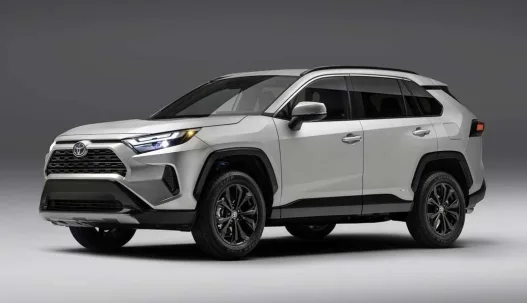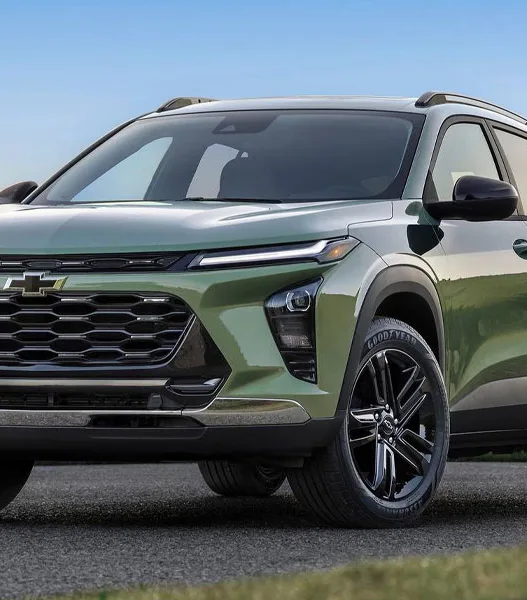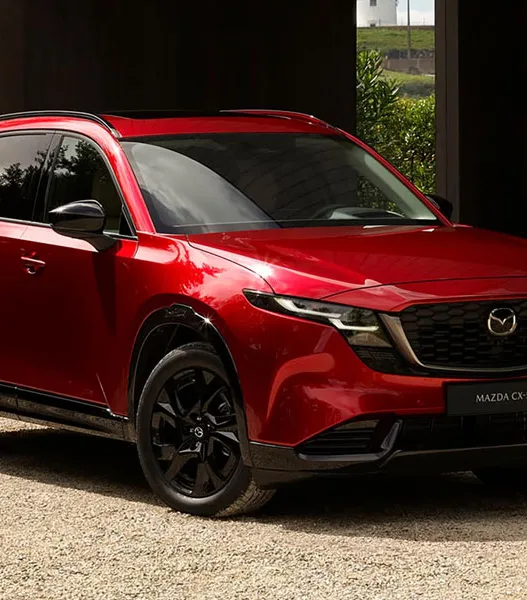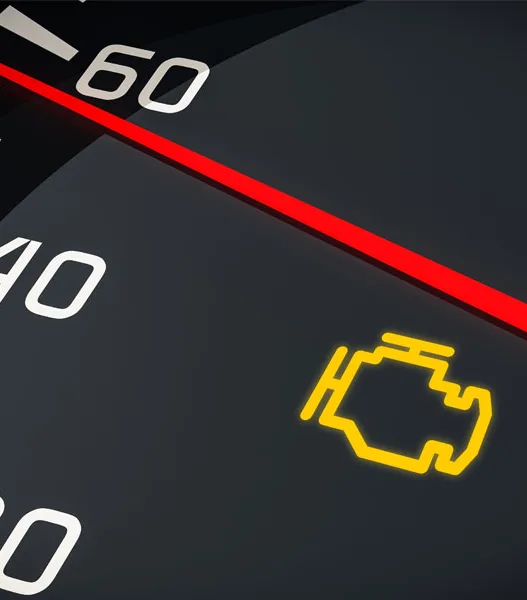I still remember the excitement of buying my first Toyota RAV4. The promise of reliability, slew of safety features, great gas mileage, and the idea of stress-free road trips had me hooked.
But what I didn’t realize was that not every RAV4 model lives up to Toyota’s reputation. After months of unexpected repairs, annoying transmission jerks, and a dashboard full of warning lights, I learned the hard way that some RAV4 years are most problematic and better avoided.
If you’re eyeing a RAV4 model, this article is for you. Here we’re going to tell you exactly which Toyota RAV4 years you should avoid and why.
Toyota RAV4 Red Flags: The Worst Years You Should Avoid
Year 2019
- Uncomfortable Ride Quality
- Acceleration is not Quick
- Noisy Engine and Transmission Lag
- Outdated Infotainment System
Year 2012
- Aggressive Fuel Consumption
- Steering is too Light
- Uncomfortable Rear Seats
Year 2008
- Transmission Problem
- Poor Ride Quality
- Excessive Oil Consumption
Year 2003
- Weak Engine
- Poor Ride Quality
- Uncomfortable Seats
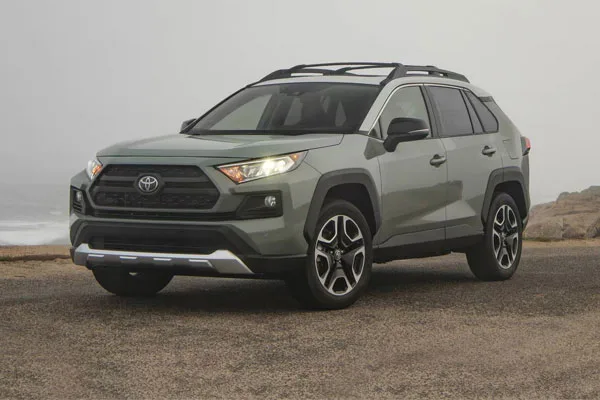
The Toyota RAV4 Year 2019, That Looked Promising but Fell Short
I would like to share with you my personal experience as to why you should not buy the 2019 model of the Toyota RAV4.
1. Uncomfortable Ride Quality
When I drove this car, the first thing I felt was its crude and uncomfortable ride quality. Its suspension seems very hard, which makes it difficult to drive on high and low roads. Especially, if you drive this vehicle on the urban or village roads, you will not feel comfortable.
2. Acceleration is not Quick
The 2.5-liter 4-cylinder engine, which produces 203 horsepower, looks good on paper, but when I drove the car, it did not accelerate quickly. With other big vehicles on the highway, I didn’t have time to change lanes, which sometimes felt frustrating. If you’re driving a high-powered SUV with a turbocharged engine, the RAV4 will make you feel sluggish.
3. Low-Quality Interior
Talking about the interior of this car, it also did not look particularly good. I found some of its materials low quality, especially the plastic of the dashboard and doors. It doesn’t give me the feeling of a luxury SUV. The rear seats also do not feel very comfortable, especially on long routes.
4. Very Noisy Engine
Another issue that bothered me was the engine. When I drove the car at high speed, the engine became so noisy that it spoiled my whole driving experience.
5. Transmission Lag
There have been several complaints about the 2019 RAV4 in terms of reliability as well. Some models complained of transmission lag, which caused the vehicle to slow down while changing gears.
6. Outdated Infotainment System
Also, the 2019 RAV4’s infotainment system disappointed me a lot. Its graphics look outdated, and sometimes even the touch-screen display does not respond.
Overall, my experience with the 2019 Toyota RAV4 wasn’t that great. This vehicle is just like a normal SUV, whose engine, ride quality, and features are nothing special. If you’re hoping for a comfortable, quiet, and powerful SUV, this model may not be the right choice for you.
2019 Model Specifications
| Engine Type | 2.5-liter inline 4-cylinder |
| Base Engine Type | Gas |
| Valves | 16 |
| Horsepower | 203 hp at 6,600 rpm |
| Torque | 184 lb-ft at 5,000 rpm |
| Transmission | 8-speed automatic |
| Drivetrain Options | Front-Wheel Drive (FWD) and All-Wheel Drive (AWD) |
| Fuel Tank Capacity | 14.5 gallons |
| Mileage | 26-35 miles per gallon |
| Seating Capacity | 5 passengers |
| Cargo Capacity | 37.6 cubic feet behind rear seats |
| Front Legroom | 41.0 inches |
| Rear Legroom | 37.8 inches |
| Safety Features |
|
| Infotainment and Connectivity |
|
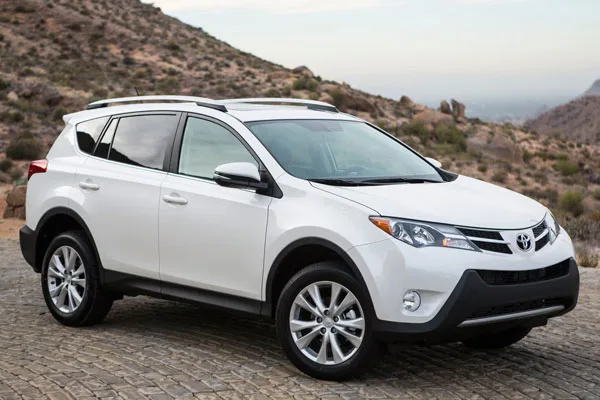
Why 2013 RAV4 Owners Wished They Waited for an Upgrade
1. Lack of Power
Despite having a 2.5-liter 4-cylinder engine, whenever I drove fast on the highway, I felt there was a slight lack of power due to slow acceleration. So, if you are an aggressive driver, this vehicle will not give you complete satisfaction.
2. Vibrating Experience
The transmission is also not good. It comes with a 6-speed automatic transmission, but sometimes you’ll feel vibrations while shifting gears. Especially when you slow down, the vehicle starts vibrating.
3. Cheap Interior
Talking about the interior, I found its build quality very cheap. Sometimes during the drive, strange noises are heard from the interior of the vehicle, which is very frustrating. The seats are also quite uncomfortable, especially if you are on a long journey.
4. Not very Good Mileage
The Toyota SAV4 2013 model doesn’t provide good mileage. In the city, it gave me 22-24 miles per gallon (MPG), which I did not like very much. Other SUVs can offer better mileage.
5. Safety Issues
Safety can also be an issue. The 2013 model of Toyota SAV4, including other old models showed some problems with the airbag system. This should also be kept in mind if you want a safe SUV.
6. Bad Driving Experience
Lastly, the suspension is also not very good. This car does not offer a smooth ride like a high-quality car. When I drive on difficult terrains, I feel a lot of jerks that completely spoil my driving experience.
2013 Model Specifications
| Engine Type | 2.5-liter inline 4-cylinder |
| Base Engine Type | Gas |
| Valves | 16 |
| Horsepower | 176 hp at 6,000 rpm |
| Torque | 172 lb-ft at 4,100 rpm |
| Transmission | 6-speed shiftable automatic |
| Drivetrain Options | All-wheel drive |
| Fuel Tank Capacity | 15.9 gallons |
| Mileage | 22-29 miles per gallon |
| Seating Capacity | 5 passengers |
| Cargo Capacity | 38.4 cubic feet |
| Front Legroom | 42.6 inches |
| Rear Legroom | 37.2 inches |
| Safety Features |
|
| Infotainment and Connectivity |
|
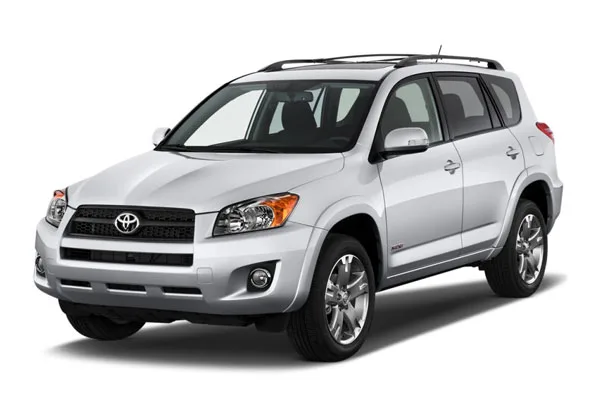
The Toyota RAV4 2012 Model That Brought More Issues Than Adventures
1. Aggressive Fuel Consumption
The biggest problem I experienced with this model was the fuel economy. The car consumed a lot of fuel when driven in urban areas.2. Steering is too Light
Steering seems a bit too light, which can make it a bit difficult to control the car on the highway.3. Uncomfortable Rear Seats
The rear seats are also not very comfortable. If you are on a long trip, you will definitely feel that the seats are somewhat uncomfortable.
2012 Model Specifications
| Engine Type | 2.5-liter inline 4-cylinder |
| Base Engine Type | Gas |
| Valves | 16 |
| Horsepower | 179 hp at 6,000 rpm |
| Torque | 172 lb-ft at 4,000 rpm |
| Transmission | 4-speed automatic |
| Drivetrain Options | Four-wheel drive |
| Fuel Tank Capacity | 15.9 gallons |
| Mileage | 21-27 miles per gallon |
| Seating Capacity | 5 passengers |
| Cargo Capacity | 36.4 cubic feet |
| Front Legroom | 41.8 inches |
| Rear Legroom | 38.3 inches |
| Safety Features |
|
| Infotainment and Connectivity |
|
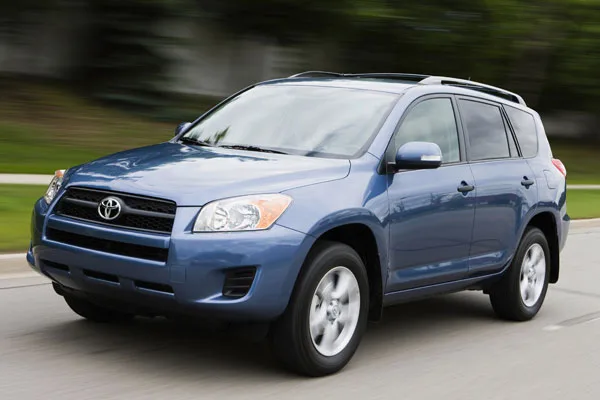
2009 – A Year of Troubles for RAV4 Fans Looking for Reliability
1. Shaky Transmission
The main problem I experienced in this model is with the engine and transmission. Many owners complain that the transmission shakes a little, and there is also the problem with the gear change. I myself felt that when I increased the speed, it was a bit hasty in responding.2. Steering is too Light
Another major problem I faced was the steering and suspension. The steering in this model feels a lot lighter than it should be, which makes it difficult to control the car at high speed on the highway. The suspension is also not very strong, which makes the experience of driving on a bumpy road uncomfortable.3. Oil Leakage
Many owners also complained about oil leakage in the Toyota RAV4 2009 model. After the vehicle covers the distance of 100,000 miles, there will be a possibility of engine oil leakage.4. Interior Buttons Wear Out Quickly
Compared to other vehicles, the quality of the interior of the 2009 model is also nothing special. The buttons on the plastic panel wear out very quickly, which makes the vehicle look even older. Yes, there is a lot of space in the car, and the back seats are also very comfortable, but this seems very small compared to its disadvantages.
2009 Model Specifications
| Engine Type | 2.5-liter inline 4-cylinder |
| Base Engine Type | Gas |
| Valves | 16 |
| Horsepower | 179 hp at 6,000 rpm |
| Torque | 172 lb-ft at 4,000 rpm |
| Transmission | 4-speed automatic |
| Drivetrain Options | Front-wheel drive |
| Fuel Tank Capacity | 15.9 gallons |
| Mileage | 22-28 miles per gallon |
| Seating Capacity | 5 passengers |
| Cargo Capacity | 36.4 cubic feet |
| Front Legroom | 41.8 inches |
| Rear Legroom | 38.3 inches |
| Safety Features |
|
| Infotainment and Connectivity |
|
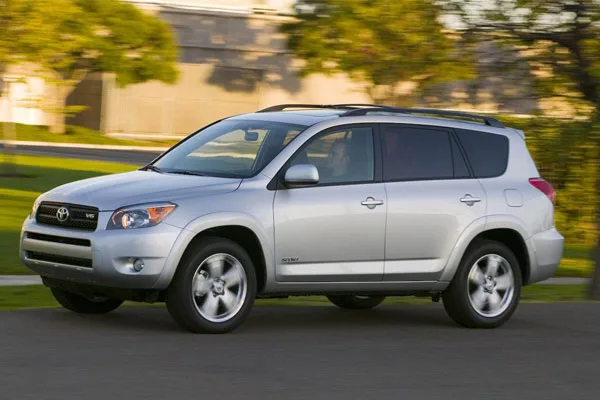
2008 – The Toyota RAV4 Year Known for Costly Repairs and Frustration
1. Excessive Oil Consumption
The 2008 RAV4 comes with a 2.4-liter 4-cylinder engine that consumes excessive oil. I always had this problem that the engine oil used to run out very quickly. Due to this, it becomes difficult to run the engine for a long time.
2. Transmission Problem
The transmission sometimes does not work properly, and when you change gears, a jerk is felt. This thing becomes frustrating, especially when you are driving in congested areas in the city.
3. Poor Ride Quality
My experience with the RAV4 2008 model has been that the older the vehicle gets, the worse the ride quality becomes. If you go on a long trip, it will not remain a comfortable ride for you, as you will start to feel pain in your back and knees.
4. Brakes Wear Out Faster
The brakes are also not the best in this model. The brake pads of the 2008 model are not of good quality and wear out faster. Many owners complained that they had to change the brake pads after every few months.
2008 Model Specifications
| Engine Type | 2.4-liter inline 4-cylinder |
| Base Engine Type | Gas |
| Valves | 16 |
| Horsepower | 166 hp at 6,000 rpm |
| Torque | 165 lb-ft at 4,000 rpm |
| Transmission | 4-speed automatic |
| Drivetrain Options | Front-wheel drive |
| Fuel Tank Capacity | 15.9 gallons |
| Mileage | 21-27 miles per gallon |
| Seating Capacity | 5 passengers |
| Cargo Capacity | 36.4 cubic feet |
| Front Legroom | 41.8 inches |
| Rear Legroom | 38.3 inches |
| Safety Features |
|
| Infotainment and Connectivity |
|
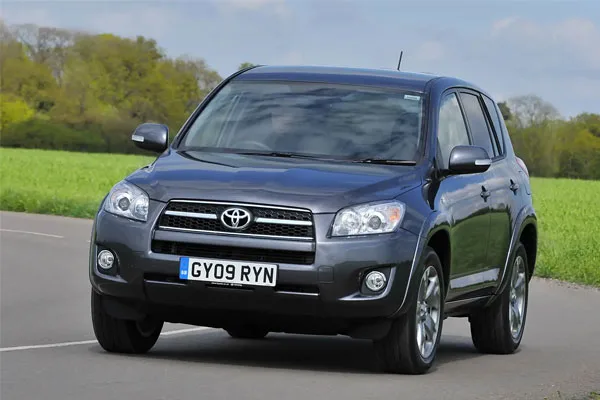
2006 – When Toyota RAV4 Took a Risk and Some Buyers Paid the Price
1. Transmission Problem
The most common problem in RAV4 models is the transmission. Many owners complained that they started feeling jerks during gear shifting within a few months. Sometimes the gears did not fit properly, and this could be very dangerous, especially while driving on the highway.2. Steering felt a bit Loose
The steering felt a bit loose at times, which made the controls feel a bit sluggish during long drives. The suspension is also not so solid; the bumps on the road were easily felt inside.3. Electrical Problems
Sometimes there is a problem with the AC and heating system. The radio and dashboard lights also went off automatically. These small electrical problems will break your heart, as you can’t expect such mistakes from an SUV like this. Eventually, when I had to sell the car, I realized that the 2006 RAV4’s resale value was not very good. People were familiar with its problems, so it became difficult to sell it at a good price.
2006 Model Specifications
| Engine Type | 2.4-liter inline 4-cylinder |
| Base Engine Type | Gas |
| Valves | 16 |
| Horsepower | 166 hp at 6,000 rpm |
| Torque | 165 lb-ft at 4,000 rpm |
| Transmission | 4-speed automatic |
| Drivetrain Options | Four-wheel drive |
| Fuel Tank Capacity | 15.9 gallons |
| Mileage | 20-25 miles per gallon |
| Seating Capacity | 5 passengers |
| Cargo Capacity | 37.2 cubic feet |
| Front Legroom | 41.8 inches |
| Rear Legroom | 38.3 inches |
| Safety Features |
|
| Infotainment and Connectivity |
|
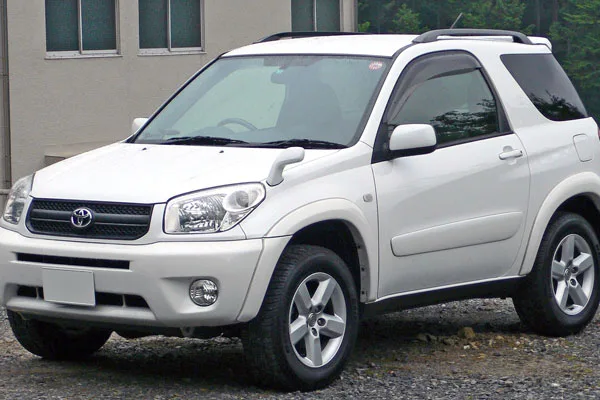
2003 – The Toyota RAV4 Model Year That Frustrated Drivers the Most
1. Weak Engine
The Toyota RAV4 2003’s engine is a bit weak compared to other SUVs. When I used to drive on the highway, I felt that it did not pick up speed quickly. On slopes or with large weights, it slows down a bit.2. Uncomfortable Seats
I also felt that the seats are not very comfortable, and the back hurts on long routes. On the other hand, suspension is also not very good; on bad roads, the car jerks a lot. While this vehicle also has some good aspects, such as its compact size due to which makes parking easy, overall, it does not seem to be a buyable vehicle. If you are looking for a reliable and comfortable SUV, this model will not be the right choice for you.
2003 Model Specifications
| Engine Type | 2.0-liter inline 4-cylinder |
| Base Engine Type | Gas |
| Valves | 16 |
| Horsepower | 148 hp at 6,000 rpm |
| Torque | 142 lb-ft at 4,000 rpm |
| Transmission | 4-speed automatic |
| Drivetrain Options | All-wheel drive |
| Fuel Tank Capacity | 14.7 gallons |
| Mileage | 20-25 miles per gallon |
| Seating Capacity | 5 passengers |
| Cargo Capacity | 29.2 cubic feet |
| Front Legroom | 42.4 inches |
| Rear Legroom | 32.6 inches |
| Safety Features |
|
| Infotainment and Connectivity |
|
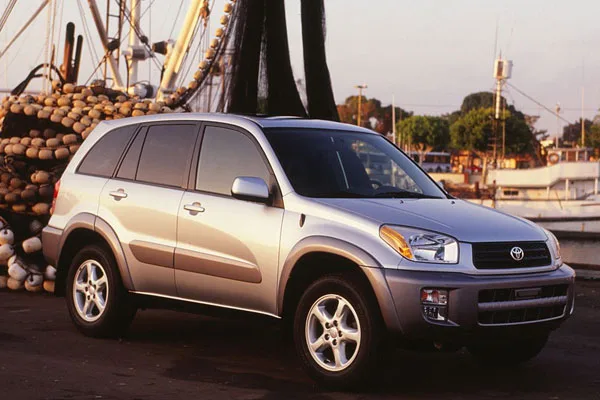
2001 – The Toyota RAV4 Year Plagued by Costly Transmission Failures
1. Fuel Economy is Not Good
The Toyota RAV4 2001 doesn’t have good fuel economy. It consumes a lot of petrol while driving in urban areas, compared to other SUV models.
2. Unbalanced SUV
I had thought that being a small SUV, it would be quite balanced, but when I drove it, I found that it was a very uncomfortable vehicle. Suspension is nothing special; it jolts hard on potholes on roads, leaving riders exhausted on long journeys.
3. Electrical Problems
I also faced numerous electrical problems in this model. Sometimes the power window stops working, and the central lock does not work properly. The performance of the AC is also not consistent; sometimes it works well, and sometimes it does not give cold air at all.
2001 Model Specifications
| Engine Type | 2.0-liter inline 4-cylinder |
| Base Engine Type | Gas |
| Valves | 16 |
| Horsepower | 148 hp at 6,000 rpm |
| Torque | 142 lb-ft at 4,000 rpm |
| Transmission | 4-speed automatic |
| Drivetrain Options | Four-wheel drive |
| Fuel Tank Capacity | 14.7 gallons |
| Mileage | 20-25 miles per gallon |
| Seating Capacity | 5 passengers |
| Cargo Capacity | 29.2 cubic feet |
| Front Legroom | 42.4 inches |
| Rear Legroom | 32.6 inches |
| Safety Features |
|
| Infotainment and Connectivity |
|
| Feature | 2019 | 2013 | 2012 | 2009 | 2008 | 2006 | 2003 | 2001 |
|---|---|---|---|---|---|---|---|---|
| Engine Type | 2.5L Inline 4-cylinder | 2.5L Inline 4-cylinder | 2.5L Inline 4-cylinder | 2.4L Inline 4-cylinder | 2.4L Inline 4-cylinder | 2.0L Inline 4-cylinder | 2.0L Inline 4-cylinder | 2.0L Inline 4-cylinder |
| Base Engine Type | Gas | Gas | Gas | Gas | Gas | Gas | Gas | Gas |
| Valves | 16 | 16 | 16 | 16 | 16 | 16 | 16 | 16 |
| Horsepower | 176 hp at 6,000 rpm | 179 hp at 6,000 rpm | 179 hp at 6,000 rpm | 166 hp at 6,000 rpm | 166 hp at 6,000 rpm | 148 hp at 6,000 rpm | 148 hp at 6,000 rpm | 148 hp at 6,000 rpm |
| Torque | 172 lb-ft at 4,100 rpm | 172 lb-ft at 4,000 rpm | 172 lb-ft at 4,000 rpm | 165 lb-ft at 4,000 rpm | 165 lb-ft at 4,000 rpm | 142 lb-ft at 4,000 rpm | 142 lb-ft at 4,000 rpm | 142 lb-ft at 4,000 rpm |
| Transmission | 6-speed automatic | 4-speed automatic | 4-speed automatic | 4-speed automatic | 4-speed automatic | 4-speed automatic | 4-speed automatic | 4-speed automatic |
| Drivetrain Options | All-Wheel Drive | Four-Wheel Drive | Front-Wheel Drive | Front-Wheel Drive | Four-Wheel Drive | All-Wheel Drive | Four-Wheel Drive | Four-Wheel Drive |
From 2001 to 2019: Toyota RAV4 Generations Compared
| Specifications | 2019 | 2013 | 2012 | 2009 | 2008 | 2006 | 2003 | 2001 |
|---|---|---|---|---|---|---|---|---|
| Engine Type | 2.5L Inline 4-cylinder | 2.5L Inline 4-cylinder | 2.5L Inline 4-cylinder | 2.4L Inline 4-cylinder | 2.4L Inline 4-cylinder | 2.0L Inline 4-cylinder | 2.0L Inline 4-cylinder | 2.0L Inline 4-cylinder |
| Base Engine Type | Gas | Gas | Gas | Gas | Gas | Gas | Gas | Gas |
| Valves | 16 | 16 | 16 | 16 | 16 | 16 | 16 | 16 |
| Horsepower | 176 hp at 6,000 rpm | 179 hp at 6,000 rpm | 179 hp at 6,000 rpm | 166 hp at 6,000 rpm | 166 hp at 6,000 rpm | 148 hp at 6,000 rpm | 148 hp at 6,000 rpm | 148 hp at 6,000 rpm |
| Torque | 172 lb-ft at 4,100 rpm | 172 lb-ft at 4,000 rpm | 172 lb-ft at 4,000 rpm | 165 lb-ft at 4,000 rpm | 165 lb-ft at 4,000 rpm | 142 lb-ft at 4,000 rpm | 142 lb-ft at 4,000 rpm | 142 lb-ft at 4,000 rpm |
| Transmission | 6-speed automatic | 4-speed automatic | 4-speed automatic | 4-speed automatic | 4-speed automatic | 4-speed automatic | 4-speed automatic | 4-speed automatic |
| Drivetrain Options | All-Wheel Drive | Four-Wheel Drive | Front-Wheel Drive | Front-Wheel Drive | Four-Wheel Drive | All-Wheel Drive | Four-Wheel Drive | Four-Wheel Drive |
Is the Toyota RAV4 Still Worth Purchasing?
After seeing all the faulty RAV4 models, you must be in doubt whether it is still worth purchasing a Toyota RAV4.
In my opinion, buying the latest RAV4 model can be a good decision. Toyota has made some significant improvements in its recent RAV4 models. First of all, its design is very modern and stylish. The new front grille and LED lights enhance its road presence.
The new 18 and 19-inch alloy wheels accentuate its rugged look. Along with this, the option of a panoramic roof makes long journeys even more pleasant. The 12.3-inch touchscreen infotainment system supports Apple CarPlay and Android Auto. Soft-touch leather upholstery and fine trims give a premium feel to its interiors. There is ample legroom in the rear seats, making it suitable for families.
The fuel efficiency is also commendable. The 2.5-liter 4-cylinder hybrid engine delivers 219 horsepower and returns a mileage of 41 miles per gallon in the city and 38 miles per gallon on the highway.
Toyota has also worked a lot on cars’ safety. The Toyota Safety Sense 3.0 system, which includes adaptive cruise control, lane-keeping assist, and automatic emergency braking, ensures our safety.
In short, if you’re on the hunt for a modern, fuel-efficient, and safe SUV, the latest Toyota RAV4 will definitely be a great choice.
Wrapping Up
I hope this information will help you make the right decision. Not every vehicle is perfect, and some models may be more problematic than others. If you’re looking to buy a used Toyota RAV4, it’s best to avoid the years mentioned above in the article.
Always be sure to get a vehicle history report or a mechanic’s opinion so you can make the best choice.
Frequently Asked Questions
1. What are the Worst Toyota RAV4 Model Years to Avoid?
2. Why Should I Avoid the 2001 and 2003 Toyota RAV4?
These models have severe automatic transmission failures, where shifting problems and hesitation lead to expensive repairs.
3. What Problems Does the 2019 Toyota RAV4 Have?
The 2019 model has complaints about transmission hesitation, fuel system defects, and poor ride quality, especially in AWD variants.
4. Are There Any Reliable Toyota RAV4 Years?
Yes, 2010, 2016, 2020, 2023, and 2025 models are considered reliable, offering strong performance, good fuel efficiency, and fewer complaints.
5. How Long Does a Toyota RAV4 Typically Last?
With proper maintenance, a Toyota RAV4 can last 200,000 to 250,000 miles or more, making it a durable SUV choice.
6. What Should I Check When Buying a Used Toyota RAV4?
Inspect for oil consumption issues, transmission problems, and electrical failures. Always review service records and get a professional inspection.












